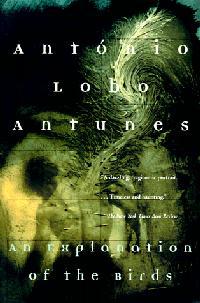 Concerned with the
demise of Rui S, an overweight professor with thinning hair and
borgeouis tendencies, over the period of three days, Lobos Antunes
constructs a surreal tale in which the characters of Rui's life comment
and analyze their relationships with him.
Concerned with the
demise of Rui S, an overweight professor with thinning hair and
borgeouis tendencies, over the period of three days, Lobos Antunes
constructs a surreal tale in which the characters of Rui's life comment
and analyze their relationships with him.Throughout the novel, the one central image is of Rui's only remaining glint of happiness, his memory of the birds as explained to him by his father during his adolescence. In the progression of the story we find this central imaged morphed and constricted into a new image, an image of Rui's father--a privileged member of Lisbon's elegant capitalist structure--collecting the birds and butterfly's of Rui's memories and pinning them, along with other various items and people in Rui's life, to cardboard sheets and filing them away in display cases besides their identifying cards.
Rui's family members, ex-wives, and associates all comment on the man's decline, illuminating his faults as the circus gathered together to watch Rui's decay observe his struggle as it approaches it's ultimate act, suicide on Rui's part. Suicide as a release is no secret, instead being divulged almost as quickly as the novel begins. But that's not the point of Lobo Antune's novel. Instead, the author has committed to capturing the last moments of this desperate professor, offering poignant descriptions of his failures and shortcomings.
Labeled as one of Portugal's "pre-eminent writers," Lobo Antunes dispenses with the traditional narrative and instead delivers an abstract and sometimes humorous portrait that propels the plot along with an intensity that builds and builds until its stark and haunting climax.